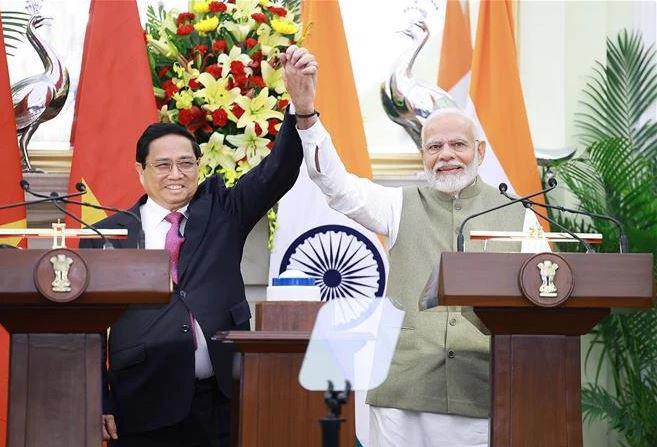Prime Minister Pham Minh Chinh and his Indian counterpart Narendra Modi held a joint press conference on the results of their talks on August 1 afternoon in New Delhi, as part of the former’s State visit to India between July 30 – August 1, according to a report from the Vietnam News Agency.
PM Modi, on behalf of the people of India, once again conveyed condolences to the people of Vietnam over the passing of General Secretary of the Communist Party of Vietnam Nguyen Phu Trong, and highlighted the late leader’s significant contributions to the development of Vietnam-India relations, especially after the two countries upgraded their relationship to a Comprehensive Strategic Partnership in 2916.
He stated that during his talks with PM Chinh, the two sides had reviewed and discussed in details the bilateral cooperation, and set out orientations to enhance the cooperation across the board, stressing that they reached consensus on elevating the Comprehensive Strategic Partnership to a new height.
The Indian PM informed that during PM Chinh’s state visit, the two sides have agreed on several specific cooperation programs and projects, such as exchange of military information; maritime cooperation, counter-terrorism, and cybersecurity; review of the ASEAN-India Free Trade Agreement; support for electronic payments; cooperation and mutual support in green economy and emerging fields; connectivity of private, small- and medium-sized enterprises, and startups; agriculture, fisheries; and culture. He added that India looks forward to welcoming more Vietnamese people to visit Buddhist sites and to study or research.
PM Modi affirmed the Vietnamese government leader’s visit to India opens a new chapter in the relations between the two countries. He said Vietnam strongly supports India's Act East Policy and the increasingly important role of India in key regional and global cooperation institutions, while India supports Vietnam's participation in the Coalition for Disaster Resilient Infrastructure (CDRI) and completing procedures to join the International Solar Alliance (ISA) initiated by India.
For his part, PM Chinh stated that he had held trustworthy, open and practical talks with his Indian counterpart, which resulted in many common perceptions and important results, affirming that the two sides shared a strategic vision on today's world, especially regarding unprecedented changes related to nature and human development.
According to the Vietnamese PM, the two leaders were pleased to acknowledge the significant progress and achievements in the bilateral relationship, particularly since they established a Comprehensive Strategic Partnership in 2016. They reaffirmed the priority and importance they place on each other in their foreign policies, and agreed to continue to preserve and strengthen the traditional relationship between Vietnam and India as sincere, trustworthy, and steadfast friends who have stood by each other throughout history, at present, and in the future.
PM Chinh said they committed to finding breakthroughs to elevate bilateral relations to a new level and to further strengthening the Comprehensive Strategic Partnership in this new strategic phase.
He said the two sides agreed that there remains potential and ample room for the two countries to intensify cooperation, and they should further strengthened the relationship to align with the common trends of the era and to serve the legitimate rights and interests of their people, and achieve each nation's development goals.
In this spirit, the two sides adopted a joint statement on strengthening the Comprehensive Strategic Partnership, and agreed to advance the bilateral cooperation under the motto of Five more, which are greater political and strategic trust; deeper defense and security cooperation; more substantive and effective vision and actions in economic, trade and investment cooperation; stronger scientific and technological cooperation and innovation, and closer cultural, tourism, and people-to-people exchanges.
PM Chinh said the two sides agreed to further deepen regional and international cooperation; continue to coordinate and support each other at multilateral forums, especially the United Nations, ASEAN, and ASEAN-led mechanisms; promote peaceful dialogue and build trust among nations; enhance ASEAN's central role; and advance Mekong sub-region cooperation mechanisms.
He said they reaffirmed the importance of ensuring a peaceful, stable, secure environment, and safe and freedom navigation and aviation in the East Sea, and resolving disputes by peaceful measures based on respect for international law, particularly the 1982 United Nations Convention on the Law of the Sea (UNCLOS). They also agreed to exchange information, enhance cooperation, and work together to develop the East Sea into a sea of peace, stability, friendship, cooperation and development.
Earlier, the two PMs announced the adoption of the joint statement on strengthening the Comprehensive Strategic Partnership and inaugurated a military software park in Nha Trang city in the south-central coastal province of Khanh Hoa, Vietnam.
They also witnessed the exchange of nine cooperation documents between the two countries and their respective ministries and agencies, including the "Action Program for the Vietnam-India Comprehensive Strategic Partnership for the 2024-2028 period, and a diplomatic note regarding Vietnam's accession to the CDRI.









 Google translate
Google translate